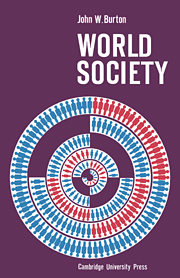12 - Concluding observations and a simulations exercise
Published online by Cambridge University Press: 14 December 2009
Summary
We commenced this examination of world society with an analysis of relations among states, and the transactions within the whole world society. We finally tested this by applying the analysis to the most important problem – the one which leads us to be interested in a study of world society – the problem of conflict and its resolution.
What has emerged is a view, an approach, a set of hypotheses and prescriptive proposals that might appear novel and even controversial if they were not a reflection of our everyday experience within our own personal social relationships. Every aspect of behaviour in world society – role behaviour, decision-making, ‘non-rational’ behaviour, the problems of perceptions, values, the spill-over of conflict, supportive approaches to conflict – relate directly to what we know by experience of behaviour in all social groups. Behaviour in world society by states, institutions and people necessarily relates to behaviour in more confined areas: any artificial separation of politics from international politics, or any approach to an understanding of world society that implies one set of theories to explain behaviour at one social level, and another set at another level, must be misleading. There will never be a ‘one world’ in an institutional sense; but there is one world in a behavioural sense. Furthermore, we will understand behaviour of states, of groups within states, and of men if we place them in the broader framework of world society.
This has been essentially a simple analysis, but not a simplified one. It is one with which we can experiment.
- Type
- Chapter
- Information
- World Society , pp. 164 - 172Publisher: Cambridge University PressPrint publication year: 1972



